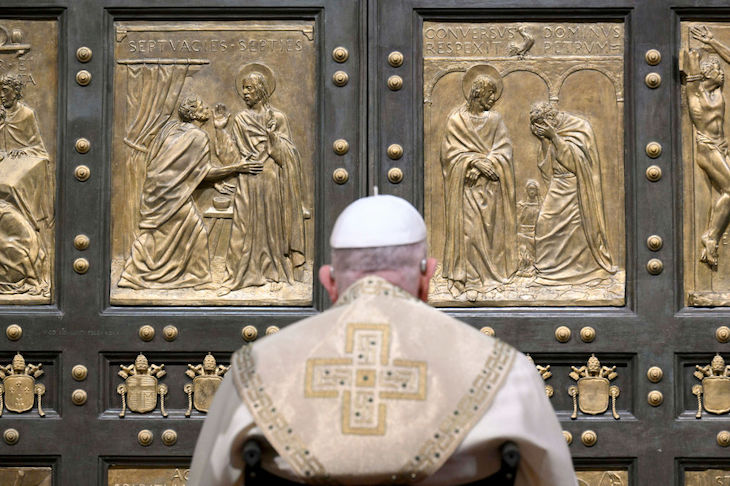Pope Francis’s death at the age of 88 was neither untimely nor a great surprise. Having made what appeared to be a miraculous recovery from double pneumonia and kidney failure – and subsequently turning up at St Peter’s in a poncho just two weeks ago – Francis appeared to have been granted a new lease of life. Despite this, he left this world on Monday morning, the day after administering the Urbi et Orbi blessing and the second day of the Easter Octave. As times go for a Pope to depart this life, he picked a suitable moment.
Many of the accounts of the Pope’s life, following his death, have bordered on the hagiographical – and, indeed, so they should be. The Pope’s characteristic humility, emphasis on mercy, and strength in criticising those in high office are laudable features of an exceptional pontificate. Among non-Catholics, he has been perhaps history’s most popular Pope.
It cannot, however, be ignored that he leaves behind a Church divided. Two camps have firmly stationed themselves within the Catholic Church, with the chasm between them only growing. The liberal and progressive side seeks less structured forms of worship, greater participation from the laity, and a shift in emphasis away from doctrinal teachings, particularly on sexuality. The other, more conservative faction seeks a return to the Traditional Latin Mass and clear teaching on ethical matters in line with Catholic tradition.
The first group were well represented in Francis’s pontificate. Amoris Laetitia, a 2016 apostolic exhortation, floated the idea that, in some cases, divorced and remarried Catholics could receive Communion; while Fiducia Supplicans, a 2023 document, permitted the blessing of same-sex unions, provided it was not analogous to marriage.
The second group were somewhat less represented under Francis. Traditionis Custodes, a 2021 apostolic letter, and its subsequent 2023 rescript, delivered by England’s own Cardinal Arthur Roche, severely restricted the use of the Latin Mass.
Against popular – or perhaps secular – wisdom, the traditionalists have youth on their side. A major 2023 study of Catholic priests in the United States showed a significant divide between older priests and those recently ordained. Just a fifth of priests ordained before 1960 described themselves as theologically “conservative/orthodox” or “very conservative/orthodox”, compared to 85 per cent of priests ordained after 2020. Perhaps most strikingly, no surveyed priests ordained after 2020 described themselves as theologically “very progressive”. Young Catholics are, in the main, increasingly traditional.
Going into the conclave, where a new pope will be elected, cardinals will certainly be aware of this growing rift between old and young, progressive and traditional, not least because these divides exist within the College of Cardinals itself.
Cardinal Jean-Claude Hollerich of Luxembourg is a leading contender among the progressives. On the Church’s view of homosexuality, the 66-year-old has said: “I believe that the sociological-scientific foundation of this teaching is no longer correct”. Hollerich has described himself as “open to the ordination of women to the priesthood”. Clearly, he has strong liberal credentials.
While Francis appointed 108 of the 135 cardinal electors (those under the age of 80), some conservatives remain. Cardinal Raymond Burke of the United States stands in stark contrast to the progressives. Dubbed “Trump’s pick”, he was openly critical of Francis’s pontificate. In response, Francis stripped Burke of most of his Vatican positions, and even evicted him from his Vatican apartment. If we were to see a “Pius XIII” follow Francis, Burke would be the candidate.
A more acceptable conservative is Cardinal Robert Sarah of Guinea. Just a few months shy of his 80th birthday, some see his inclusion as providential. If traditional Catholics on X had a vote, he would likely be Pope. Sarah has argued against migration, stating that it is “a false exegesis to use the word of God” to promote it. He is a staunch supporter of the Latin Mass. The bookies make him 8/1 to replace Pope Francis. Without wishing to question their methods of discerning odds, that seems very generous.
It seems likely, however, that pragmatism will likely prevail. Moderate candidates abound. None are more palatable than Cardinal Luis Antonio Tagle of the Philippines. A smiling polyglot who studied under Benedict XVI but was a key ally of Francis, Tagle is relatively youthful at the age of 67. He also represents the global South, where the Church grew by 900 per cent during the 20th century.
As Pope Francis offered the Urbi et Orbi blessing on the day before his last, he left the world with a parting message of peace: this was characteristic of his pontificate. Now, it falls to the cardinals to bring that message of peace to the Catholic Church itself. It is unclear which direction the cardinals will take, yet their task is not merely to elect a successor, but to choose a shepherd capable of bringing together a fractured flock. Much will be said about how the secular world views the next pope, but his greatest challenge won’t be perception: it will be to unite his people before the fractures become irreparable.







Comments